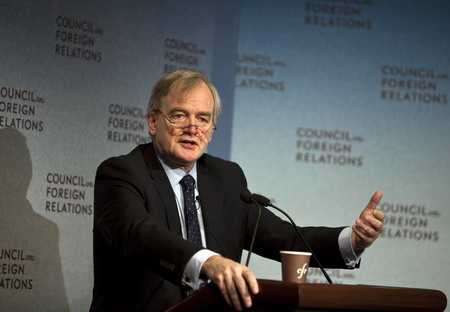Economy
Europe debt crisis to have limited impact on China
By Wang Bo (China Daily)
Updated: 2010-05-27 10:42
 |
Large Medium Small |
|
 |
|
Willem Buiter, chief economist at Citigroup Inc, speaks at the Council on Foreign Relations in New York. [Ramin Talaie / Bloomberg] |
BEIJING - The contagion from the European sovereign debt crisis is expected to have a limited impact on China, and the real risk lies in its ripple effect on the United States that might drive down the nation's growth momentum as it exports to developed countries wither, senior economists at Citigroup said on Wednesday.
"On the financial front, China has a very high level of reserves to withstand volatility in capital flows and the exposure of European banks in the country is very limited," said Shen Minggao, head of China research at Citigroup.
"But China's exports might face serious tests, as the debt crisis in the eurozone is at risk of spilling over to the US, another big trade partner for China," Shen said. Europe is now China's largest trade partner and export destination, accounting for 20 percent of the country's total exports.
In order to safeguard the euro, the European Central Bank pledged earlier this month to give $670 billion in loans and loan guarantees to any eurozone country needing funds, plus about $322 billion from the International Monetary Fund.
But economists said the European situation is far from stable. "Even if the liquidity problem is solved, the market will turn its attention to countries such as Spain, Portugal and Italy, which are in bad shape fiscally, but are not facing the obvious sovereign insolvency problem that Greece does face," said Willem Buiter, chief economist of Citigroup.
This situation is particularly the case in China, which has seen clear signs of economic overheating domestically, but the policymakers are reluctant to adopt heavy-duty weapons to cool the economy amid concerns over the European crisis and a sharp slowdown in the domestic economy.
The Chinese economy grew 11.9 percent in the first quarter, while the consumer price index rose to 2.8 percent in April, the highest in 18 months.
"The European situation complicated China's policymaking," Shen said. He expected that China would resort to interest rate hikes if consumer inflation climbs to over 4 percent, or the Federal Reserve hikes rate earlier than expected.
Citigroup economists delayed their rate hike forecast for the Fed to the second quarter of next year, and expect China to raise its interest rate once or twice this year to ease inflationary pressure.
"In terms of rate hikes, the US is less keen to move early, as European demand for US services is weakening and the appreciation of the dollar has already tightened the financial condition in the country," Buiter said.



